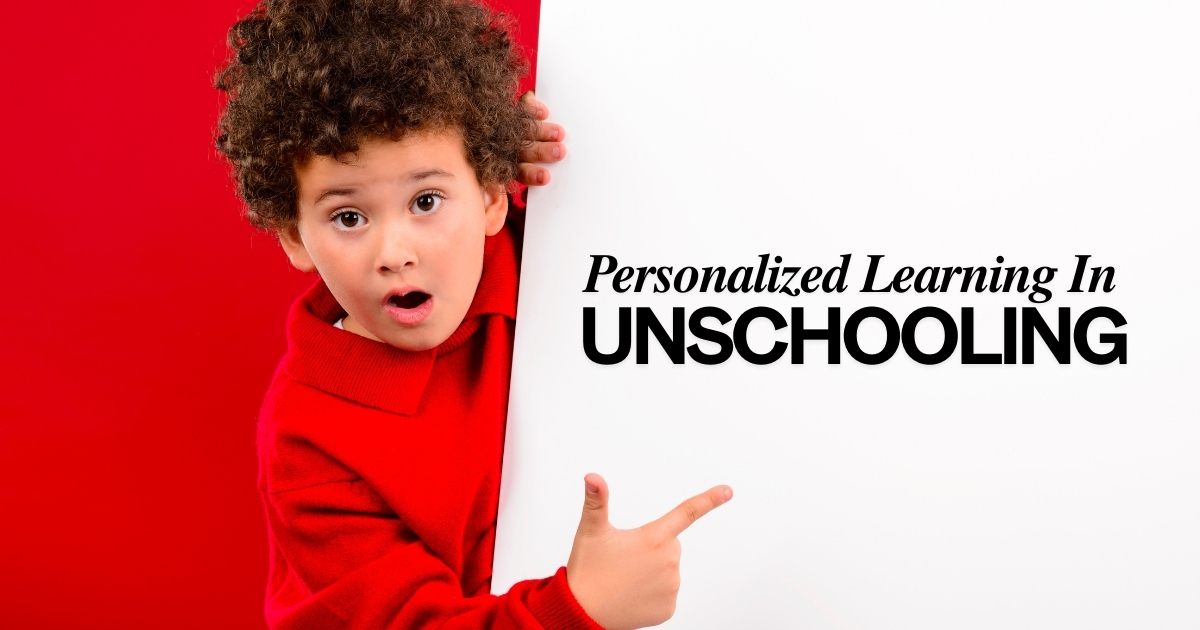In today’s evolving educational landscape, personalizing learning to fit each child’s unique needs is gaining significant traction. This shift has been particularly evident within the unschooling community, where parents take an unconventional approach to homeschool education. Unschooling embraces the idea that learning should be a child-led adventure driven by curiosity and passion rather than rigid curriculums. For parents exploring this path, understanding how to tailor education to their child’s learning style, pace, and interests is crucial. In this blog post, we’ll explore the benefits of personalized homeschool education through the unschooling method, provide practical examples, and offer tips on tracking progress to ensure a well-rounded educational experience.
Personalized homeschooling prioritizes a child’s interests, strengths, and learning pace, creating an environment where education feels more like a natural extension of daily life rather than a series of mandatory tasks. This approach acknowledges that every child learns differently, and a one-size-fits-all curriculum can hinder a child’s potential. By focusing on individual interests and adapting teaching methods accordingly, personalized homeschool education encourages children to become active participants in their learning journeys.
In an unschooling setting, parents observe their children’s natural inclinations and design learning activities that align with these interests. For instance, a child fascinated by space might explore astronomy through books, documentaries, and star-gazing activities. This not only makes learning enjoyable but also deepens the child’s understanding and retention of the subject matter. Personalized homeschooling also allows for flexibility in scheduling and pacing. Traditional school systems often follow a strict timeline, which can be stressful for children who need more time to grasp certain concepts. In contrast, unschooling enables children to learn at their own speed, fostering a more relaxed and supportive educational atmosphere.
Tailoring education to fit each child’s unique needs offers numerous benefits that extend beyond academic achievement. One of the most significant advantages is the development of a love for learning. When children are actively engaged in their education and pursue topics that interest them, they are more likely to develop a lifelong passion for learning. Personalized homeschool education also fosters creativity and innovation. By encouraging children to explore their interests and think critically, parents help them develop the skills needed to solve complex problems and generate new ideas. This creative mindset is essential in today’s rapidly changing world, where adaptability and innovation are highly valued.
Furthermore, individualized learning experiences promote emotional and social development. Children who feel supported and understood in their learning environments are more likely to develop self-confidence and resilience. They also have more opportunities to engage in meaningful social interactions, whether through collaborative projects, community involvement, or online networks.
Project-Based Learning & Experiential Education
One of the most effective ways to implement personalized homeschool education is through project-based learning. This method involves engaging children in hands-on projects related to their interests, promoting active exploration and problem-solving skills. Projects can range from building a model volcano to designing a simple website, depending on the child’s passions. For example, a child interested in environmental science might undertake a project to create a miniature ecosystem. They could research different plant and animal species, understand their roles within the ecosystem, and build a terrarium. This project would encompass various subjects such as biology, geography, and even art, providing a holistic learning experience.
Project-based learning not only keeps children motivated but also helps them develop critical thinking, collaboration, and time-management skills. By working on projects they care about, children are more likely to invest effort and creativity, resulting in a deeper and more meaningful understanding of the topics at hand.
Experiential education is another key component of personalized homeschool education within the unschooling framework. This approach emphasizes learning through direct experiences and reflection, making abstract concepts tangible and relevant. Activities such as field trips, nature walks, and community service projects provide rich opportunities for experiential learning. Imagine a child interested in history visiting a local museum to learn about ancient civilizations. This hands-on experience would allow them to see artifacts up close, engage with interactive exhibits, and participate in educational programs offered by the museum. Such experiences make history come alive, fostering a deeper appreciation and understanding of the subject. Experiential education also encourages children to connect their learning to the real world, making it more meaningful and memorable.
By engaging in activities that require observation, experimentation, and reflection, children develop a more nuanced understanding of the subjects they study, as well as valuable life skills.
Self-Directed Study & Tracking Progress
Self-directed study is a fundamental aspect of personalized homeschool education, particularly in unschooling. This approach empowers children to take charge of their learning, following their interests and curiosity. Parents act as facilitators, providing resources, guidance, and support rather than dictating what and how their children should learn. For instance, if a child expresses an interest in robotics, parents can provide materials such as books, kits, and online courses to help them explore this field. The child can then set their own goals, choose projects, and learn at their own pace. This autonomy fosters a sense of ownership and responsibility, motivating children to pursue their passions with enthusiasm.

Self-directed study also allows children to develop important skills such as self-discipline, time management, and resourcefulness. By navigating their learning paths, they become more independent and confident learners, better prepared for lifelong learning and future challenges.
One of the common concerns about unschooling and personalized homeschool education is how to track progress without a traditional curriculum. While it may seem challenging, there are effective ways to ensure that children receive a comprehensive and well-rounded education. Parents can create a portfolio for each child, documenting their learning experiences, projects, and achievements. This portfolio can include written reflections, photographs, samples of work, and any other evidence of learning. By regularly reviewing these portfolios, parents can assess their children’s progress and identify any gaps that need to be addressed.
Another approach is to set flexible learning goals based on the child’s interests and developmental stages. These goals can be revisited and adjusted as needed, providing a sense of direction without imposing rigid standards. For example, a parent might set a goal for their child to improve their writing skills by keeping a daily journal or composing short stories. Additionally, parents can seek out feedback from external sources such as educational consultants, mentors, or online communities. Engaging with other homeschooling families and experts can provide valuable insights and support, ensuring that children receive a well-rounded education that meets their individual needs.
Building Community & Addressing Common Concerns
One of the most rewarding aspects of unschooling is the sense of community it offers. Connecting with other unschooling families can provide valuable support, inspiration, and resources. Many unschooling communities organize events, workshops, and online forums where families can share their experiences and learn from one another. Joining a community also offers opportunities for children to form friendships and collaborate on projects. These social interactions are essential for their overall development and help them build strong communication and teamwork skills. Being part of a supportive network can make the unschooling journey more enjoyable and fulfilling for both parents and children.
While the benefits of personalized homeschool education are numerous, it’s natural for parents to have concerns and questions about this approach. One common concern is whether children will be adequately prepared for higher education and future careers. Research has shown that homeschooled students, including those who follow an unschooling approach, often perform well in college and beyond. They tend to be self-motivated, independent learners with strong critical thinking skills. Another concern is the potential lack of socialization. However, unschooling families can address this by actively seeking out social opportunities for their children. Participating in community activities, joining clubs, and attending homeschooling groups are just a few ways to ensure that children have ample opportunities to interact with peers and develop social skills.
A Smooth And Manageable Experience
For parents considering a shift to personalized homeschool education, the transition can feel daunting. However, taking small, gradual steps can make the process smoother and more manageable. Start by observing your child’s interests and learning preferences, and experiment with incorporating these into your daily routines. Gradually introduce project-based and experiential learning activities, and be open to adjusting your approach as needed. It’s also helpful to connect with experienced unschooling families and seek out resources that offer guidance and support. Many books, blogs, and online communities provide valuable insights and practical advice for parents embarking on this educational journey.
Personalized homeschool education through the unschooling method offers an innovative and flexible approach to learning that celebrates each child’s unique potential. By tailoring education to fit individual interests, strengths, and learning styles, parents can create a rich and engaging learning experience that fosters a love for learning and prepares children for a successful future. Whether you’re new to unschooling or looking to refine your approach, remember that the key to success lies in observing your child’s needs, staying flexible, and creating a supportive learning environment. By doing so, you can unlock a world of possibilities and help your child thrive in their educational journey. Ready to take the next step? Explore our resources on personalized homeschool education and connect with fellow unschooling families to begin your adventure today.


